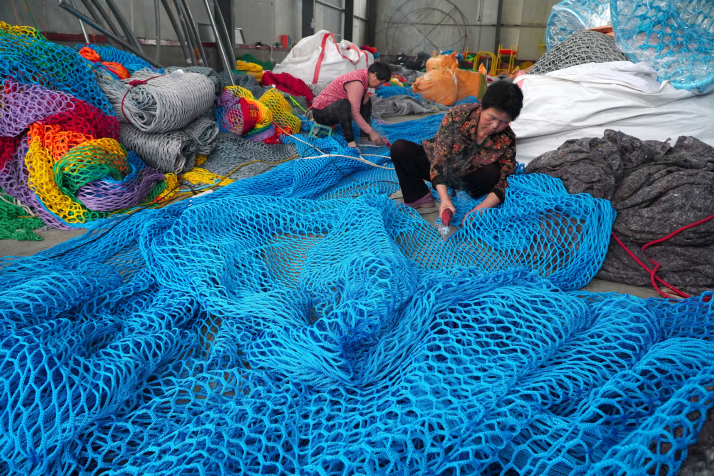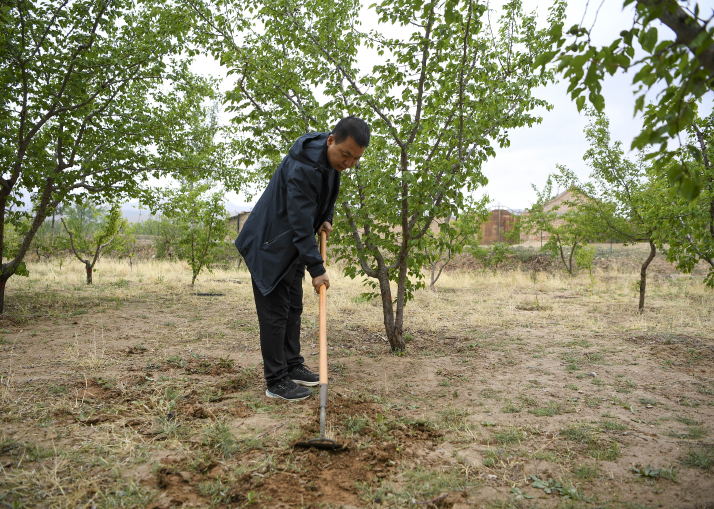| China |
| Family businesses thrive in rural courtyards | |
|
|
 Villagers weave nets in a courtyard in Huimin County, Shandong Province, on May 5 (XINHUA)
In a courtyard in Xinsheng Village in Wuzhong City of Ningxia Hui Autonomous Region, apricot trees are beginning to bear fruit. The fruits are of a special variety that can naturally dry on the trees after they ripen. The dried fruit can sell for more than 100 yuan ($14.2) per kg. The trees belong to Tian Lin, a villager who grows them in and around his own courtyard. The practice of growing fruit trees in one's own courtyard is part of the courtyard economy, a business form in which rural families carry out small-scale production at home or in surrounding areas to achieve self-sufficiency or make a profit. Learning from Tian's experience, the village leaders decided to develop a courtyard economy to increase residents' incomes. From the beginning of last year, the village has bought more than 20,000 apricot saplings and planted them around the courtyards of more than 400 households that have escaped poverty in recent years. These households are responsible for taking care of the trees and the income generated from the trees will go to them. Revitalizing rural areas Gu Siliang, secretary of the village branch of the Communist Party of China, told Xinhua News Agency the small courtyards have big potential for increasing rural people's incomes and they have an important role to play in consolidating the results of poverty alleviation. Villages in China have been developing courtyard economies based on their own strengths and come up with various forms of courtyard economy including agriculture, tourism, and handicraft making. Li Jinhua, a villager on Xinqiao Farm in Wenan County, Langfang City of Hebei Province, grows cherries in and around her courtyard. "The cherry orchard draws tourists to come and enjoy the blossoms in spring and to pick cherries in summer. They can also try the food I cook. The family farm can bring me an income of more than 40,000 yuan ($5,677) every year," Li told Beijing-based Economic Daily. Fang Hui, head of the Wenan County Agriculture and Rural Affairs Bureau, said that the county has developed a courtyard economy to increase farmers' incomes and promote rural revitalization, and has guided local farmers to develop specialty industries such as growing herbs in their courtyards. In just five years, the county has involved more than 80,000 households in the courtyard economy, improving the living standards of rural people. In addition to increasing income and promoting employment, the courtyard economy also serves to beautify rural environment. Weixi County in Yunnan Province used to be a deeply impoverished region and some villages had poor sanitation. In recent years, the county has launched rural tourism programs in its villages and villagers have renovated their courtyards and transformed them into homestays. Xiao Jinhong, a villager in Qibie Village in the county, has decorated his homestay with ornamental plants such as succulents. He told Xinhua News Agency that many guests take photos of his beautiful yard and the pleasant environment has helped his homestay attract more tourists.  Tian Lin, a villager in Xinsheng Village, Wuzhong City, Ningxia Hui Autonomous Region, clears weeds in an apricot orchard in front of his home on May 6 (XINHUA)
Profitable businesses Aside from agriculture and tourism, villages have been developing a wide variety of industries in courtyards to boost rural revitalization. In Yaomadu Village in Dacheng County of Hebei Province, resident Ma Le and his wife run a workshop in their courtyard making walking sticks out of mahogany. Mahogany's reddish-brown color makes it one of the most valuable timber species in the world. Ma told Economic Daily that his family factory can produce around 150 walking sticks every day and generate revenue of more than 300,000 yuan ($42,880) every year. Li Yucheng from the same village also runs a small workshop in his courtyard, producing small items from mahogany such as fans and combs. Li said that his workshop can generate more than 400,000 yuan ($56,769) of revenue every year and he hopes to recruit more workers to help more fellow villagers make money. Dacheng County now has six villages specializing in producing wooden handicrafts. The county has 1,800 courtyard workshops, which have involved more than 7,000 people and achieved aggregate annual revenue of more than 400 million yuan ($57.2 million). A courtyard in Wangbitun Village in Dachang Hui Autonomous County in Hebei Province has been transformed into a workshop producing cloisonné handicrafts. Xu Guowei, owner of the workshop, said that some of the handicrafts produced by the workshop have been used as gifts during official international exchanges. Chinese cloisonné enamel is one of the nation's most famous traditional handicrafts. The technique traditionally uses fine copper wires to create patterns of enclosures that are then filled with colored enamel glaze before being fired. Dachang has a long history of making cloisonné handicrafts. The county has trained more than 500 craftspeople and has set up workshops in courtyards, creating more than 2,000 jobs. At present, more than half of China's cloisonné products are produced in the county, bringing in more than 100 million yuan ($14.2 million) in sales each year. This year for the first time, the courtyard economy was included in China's No.1 Central Document—which is issued by China's central authorities each year as an important indicator of policy priorities in rural work for the year. The document encourages all rural people in regions that have escaped poverty to develop courtyard economy if conditions allow. Experts say the courtyard economy is an important part of the rural economy and small courtyards will unleash even more potential once they are connected to the larger market. However, small-scale enterprises are more susceptible to market risks, which rural people often have to face by themselves. Therefore, experts have suggested that the government should provide preferential loan and taxation policies and give more technical support to people engaged in these types of businesses. Ma Feng, head of the Tongzhou District Agricultural Resource Bureau in Nantong, Jiangsu Province, told Economic Daily that in addition to policy support, well-educated young people should be encouraged to join the initiative to help achieve higher and more sustainable returns. (Print Edition Title: Small Courtyards, Big Potential) Copyedited by G.P. Wilson Comments to jijing@cicgamericas.com |
|
||||||||||||||||||||||||||||
|